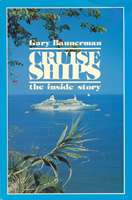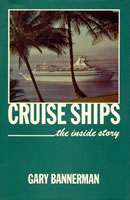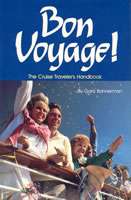Cruise Ships: The Inside Story
 Written by Gary Bannerman and published by Saltaire
Publishing Ltd. of Sidney, B.C., in 1974, was the first travel guide book to the modern
cruise era. Charles R. White, a noted Canadian broadcast executive, and the president of
the small publishing company was a personal friend of Stanley B. McDonald of Seattle,
founder of Princess Cruises. Written by Gary Bannerman and published by Saltaire
Publishing Ltd. of Sidney, B.C., in 1974, was the first travel guide book to the modern
cruise era. Charles R. White, a noted Canadian broadcast executive, and the president of
the small publishing company was a personal friend of Stanley B. McDonald of Seattle,
founder of Princess Cruises.McDonald, along with prominent
Norwegian ship owners, was among the first to recognize the dynamic potential of cruise
ships as a destination, not merely a mode of transportation. Most of the great steamship
companies - P&O, Cunard, The Italian Line, Holland America, Union Castle Line and
Chandris - had dabbled with vacations at sea, but they all seemed to embrace a defeatist
attitude well into the 1960s. And they still constructed ships better suited to the great
era of the North Atlantic, than the requirements of a vacation market.
McDonald first chartered an old ship for the 1962 Seattle World's Fair,
transporting and housing visitors in a circle route that included Vancouver, Victoria and
Seattle. In years following the fair, he chartered an old Canadian Pacific Princess ship
and pioneered winter cruises from Los Angeles to Mexico.
Meanwhile, Norwegian owners partnered with Florida tour brokers (most
notably Ted Arison, who would found Carnival Cruises), and started marketing Caribbean
vacations out of Miami.
The steamship era viewed aircraft as competition, and the traditional
companies mounted ever more futile efforts to compete. The new breed viewed airplanes as
partners, flying passengers to their ships.
By the early 1970s, P&O, Cunard and Holland America had recovered
and were becoming important players in the cruise market, but the dynamic leaders were
McDonald's upstart Princess Cruises, Arison's Carnival, Norwegian Caribbean Line, Royal
Caribbean Line, Swedish America Cruises, Norwegian American Line and the classiest of the
lot, a youthful Norwegian entry, Royal Viking Line. There were several others.
And no one knew anything about it. Charles White researched bookstores
and libraries and discovered countless books about the glory days of the steamship era and
even books about their agonizing decline, but nothing about the dramatic vacation story
taking place on the seas of the world.
 He assigned Gary Bannerman to write a
book to not only capture this story but to also serve as a guide book to prospective
passengers. Cruise Ships: The Inside Story was the result. The first edition sold
well in Canada and in California, and,
particularly, aboard Princess Cruises ships as sea. He assigned Gary Bannerman to write a
book to not only capture this story but to also serve as a guide book to prospective
passengers. Cruise Ships: The Inside Story was the result. The first edition sold
well in Canada and in California, and,
particularly, aboard Princess Cruises ships as sea.
 In 1982, the book was completely revised and metamorphosed into a hard
cover edition for Collins Publishers, one of the largest publishing firms in the world.
Subsequent editions were published in Chicago for the U.S. market by Passport Books, a
division of National Textbook Company, with separate editions in 1985 and 1986. Passport
re-titled the book Bon Voyage: The Cruise Travelers Handbook. In 1982, the book was completely revised and metamorphosed into a hard
cover edition for Collins Publishers, one of the largest publishing firms in the world.
Subsequent editions were published in Chicago for the U.S. market by Passport Books, a
division of National Textbook Company, with separate editions in 1985 and 1986. Passport
re-titled the book Bon Voyage: The Cruise Travelers Handbook.
By the late 1980s, there were many dozens of different books dealing
with the cruise ship phenomenon, including excellent guides by Fodor's, Fieldings and
other prominent travel organizations. Despite subsequent invitations to write a new cruise
ship book, BANNERLINE decided that the revenue potential, in view of a market splintered
among many competitors, would not warrant the time and investment required.
But Stan McDonald's recommendation and Charles White's initiative
created an extraordinary chapter for BANNERLINE. Over a 20-year period Gary Bannerman
regularly appeared on regional, national and international media, and spoke at countless
numbers of events, as an authority on the cruise ship industry. Through it all, Gary and
Patricia traveled the world on ships, from Istanbul, Athens and the Aegean to the
Mediterranean and the Baltic, and from the North Atlantic and the Americas to the South
China Sea.
The lack of a book project has not lessened their interest. They
continue to closely follow the evolution of the cruise industry and, when time is
available, take vacations at sea. |
